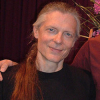Alex Grey

Alex Grey
Alex Greyis an American visionary artist, author, teacher, and Vajrayana practitioner. His body of work spans a variety of forms including performance art, process art, installation art, sculpture, visionary art, and painting. Grey is a member of the Integral Institute. He is also on the board of advisors for the Center for Cognitive Liberty and Ethics, and is the Chair of Wisdom University's Sacred Art Department. He and his wife Allyson Grey are the co-founders of The Chapel of Sacred...
NationalityAmerican
ProfessionPainter
Date of Birth29 November 1953
CityColumbus, OH
CountryUnited States of America
Artists are most themselves when they are out of their minds, transcending the ego skirmishes of conceptual thought, and intuitively relinquishing control to the greater Creator
Realism and Naturalism rely mostly on the eye of the flesh. Abstract, conceptual and surrealistic art rely mostly on the eye of the mind. Great works of art rely on the eye of contemplation, the eye of the spirit.
It was 1975. I had spent the year at the Boston Museum School doing some very bizarre performance works. The last one included going to the North Magnetic Pole and spending all of my money.
Journeying through secret doors, curving corridors, and connecting rooms into the mountain was like being digested by the different organs of a deity.
The inevitable consequence of love is the building of temples.
I think that that's why artists make art - it is difficult to put into words unless you are a poet. What it takes is being open to the flow of universal creativity. The Zen artists knew this.
The web of life, love, suffering and death unites all beings.
Art is a delivery system for worldviews.
The many faces of Collective Vision united by the mandalic eye-field suggest both expansion of consciousness and sharing of consciousness with other beings. The painting was based on a profoundly ego dissolving entheogenic mystical trance where I heard the words, 'Infinite Oneness... the Oneness should never forget the Infinitude and the Infinitude should never forget the Oneness...'
When artists give form to revelation, their art can advance, deepen and potentially transform the consciousness of their community.
Do solemnly swear to love, honor and obey my soul, my path to realization and relationship with a higher, deeper creative power, for better or worse, for richer or poorer, in sickness and in health, from now and forever more.
To bare our souls is all we ask, to give all we have to life and the beings surrounding us. Here the nature spirits are intense and we appreciate them, make offerings to them - these nature spirits who call us here - sealing our fate with each other, celebrating our love.
It is the prayer of my innermost being to realize my supreme identity in the liberated play of consciousness, the Vast Expanse. Now is the moment, Here is the place of Liberation.
In a society that tries to standardize thinking, individuality is not highly prized.